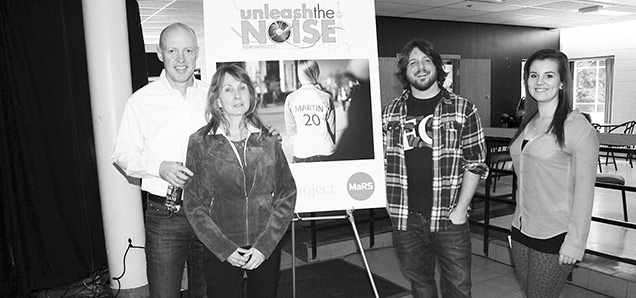Event shines spotlight on students' mental health
 CREDIT: ERIKA FAUST
CREDIT: ERIKA FAUST(From left) Eric Windeler, Anita O�Keefe, Zack Dodge and Kaylie Dyck all offered different perspectives on youth and mental health at the roundtable discussion on March 25.
On March 25, representatives from the Fanshawe community started a conversation about a very difficult but important topic: youth and suicide.
The roundtable discussion was led by Fanshawe Student Union President Zack Dodge, The Jack Project founder Eric Windeler, graphic design student Kaylie Dyck and counsellor Anita O'Keefe from Fanshawe's Counselling and Accessibility Services. The event was co-sponsored by the FSU and faculty union Local 110.
The discussion started off with a video featuring Windeler talking about his son, Jack, for whom The Jack Project is named. Jack was just finishing up his first year at Queen's University in Kingston in 2010 when he committed suicide. Jack was 18 years old, and was likely severely depressed, Windeler said in the video, but he didn't reach out for help.
“Mental health problems can seem invisible, but they are real, as real and as powerful as cancer or heart disease. And the symptoms are also real and beyond the control of the sufferer, just like the symptoms of any physical illness,” Windeler says in the video. “Sadly, mental health problems are also very common; they touch almost every family. In fact, likely you know someone who is suffering right now, and quite possibly, you and that someone never talk about it because of the stigma, which is something we have to eliminate.”
According to the video, one out of four people between the ages of 15 and 24 deals with mental health issues, and many don't know how to reach out. In fact, two-thirds of people who are struggling never get the help they need.
“By learning and talking — really, really talking — we can eliminate the stigma around mental health problems and bring the issue out from the shadows and into the open and start making a real difference,” Windeler continues in the video. “My son's legacy can be one of helping others find the help he did not know about and could not reach out for.”
The Jack Project aims to spread awareness about mental health issues and open a discussion across Canada, breaking the stigma of mental health and suicide. The Jack Project has held walks, marathons and bike rides across the country to raise money for Kids Help Phone. The Project has made an investment into the live chat feature of the Kids Help Phone website, so that young people who need help can reach out over the Internet.
After the video, student Kaylie Dyck provided the student perspective on mental health and suicide, reading a story on behalf of a friend whose close friend committed suicide at a young age. “You have to be there for (friends dealing with mental health issues),” Dyck said.
One resource Fanshawe students can to turn to for help is Counselling and Accessibility Services on campus. In the last semester, counsellors completed 40 suicide risk assessments with students. In cases where a suicide risk assessment is made, “that counsellor is very, very concerned about that student committing suicide,” explained counsellor Anita O'Keefe. “There were also many students who discussed their feelings of depression, anxiety, feelings of being overwhelmed, and we came up with a plan, a strategy (for each of them).” Students at Fanshawe who are dealing with these feelings are far from alone, and can turn to on-campus counselling services for help. Appointments are free and confidential, and are also available on an emergency basis.
Windeler said he wanted the audience members to walk away from the discussion with two important things in mind. The first is that a distinct, prolonged change in a friend's behaviour can be a real warning sign of distress. “Everybody can have a bad day, everyone can fail a test and be upset and get pissed off,” Windeler said. “But if you notice a prolonged change in behaviour in someone you know and it feels wrong in your gut, it just doesn't seem like them, that is most likely some sign of some sort of distress.” If you do notice a problem, the second thing to remember is to do three things: Ask if your friend is considering self-harm or suicide. Support them to get the help they need, and Stay with them until you can get them to a trusted adult such as a counsellor, or to a hospital if it is an emergency situation.
At the end of the event, FSU and Local 110 presented the Jack Project with a cheque for $1,000.
For more information and for resources, go to thejackproject.org.
For help on campus, go to Counselling and Accessibility Services in F2010 or call 519-452- 4282. You can also get help online at icopeu.com/fanshawe.
Some warning signs or signals that a friend may need help:
- Recurring suicidal thoughts dreams or fantasies
- Showing signs of sadness and hopelessness
- Loss of interest in usual activities
- Loss of energy
- Changes in appetite or weight
- Changes in behaviour
- Change in sleep patterns
- Negative comments about themselves













